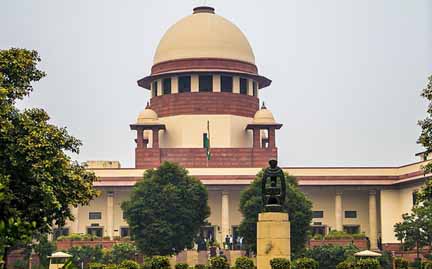
NEW DELHI (TIP): In a quick of turn of events, Chief Justice of India D.Y. Chandrachud on October 16 referred the challenge to the validity of the electoral bonds scheme, which facilitates anonymous donations to political parties, to a Constitution Bench of five judges. During the oral mentioning hour, the Chief Justice said the court had received a plea to refer the case from the current three-judge Bench to a larger Bench of at least five judges. He said the case would now go before a five-judge Bench due to “importance of the issue”. The court said the case would, as scheduled in an earlier hearing on October 10, be listed before a five-judge Bench on October 31. By refusing to delay the hearing for the formation of a five-judge Bench, the court has sent a clear message to the government that it does not intend to delay the hearing anymore. The case has been pending in the Supreme Court for over eight years now. “We are here to decide the case,” Chief Justice Chandrachud had observed in the October 10 hearing. Advocate Prashant Bhushan, for petitioner NGO Association for Democratic Reforms, had pressed the court to hear and decide the electoral bonds issue before the Lok Sabha election in 2024.
The court has agreed to the petitioners’ urging to focus primarily on two issues concerning the electoral bonds scheme, that is, the legalization of anonymous donations to political parties, and the violation of citizens’ right to information about the funding of political parties, promoting corruption. The two issues concern violation of Articles 19, 14 and 21 of the Constitution. The five-judge Bench may also not wade into the legal question concerning the passage of the electoral bonds scheme as a Money Bill. It may, instead, wait for a seven-judge Bench to deliver an authoritative pronouncement on “when a Bill could be designated a Money Bill”. The electoral bonds scheme was passed as a Money Bill, circumventing the Rajya Sabha. Advocate Shadan Farasat, for a petitioner, said the scheme had completely “anonymized” and “sanitized” political donations, giving scant information to the public. He said even amendments were introduced in the Companies Act by which a company could throw a cloak of anonymity to its donations to political parties via purchase of electoral bonds. Advocate Bhushan had argued that amendments made via Finance Acts of 2016 and 2017, both passed as Money Bills, had through the electoral bonds scheme, “opened the floodgates to unlimited political donations”.
“The amendments have removed the caps on campaign donations by companies and have legalized anonymous donations. The Finance Act of 2017 has introduced the use of electoral bonds which are exempt from disclosure under the Representation of Peoples Act, 1951, opening doors to unchecked, unknown funding to political parties,” Bhushan had argued.
The Finance Act, 2016, had also amended the Foreign Contribution Regulation Act, 2010, to allow foreign companies with subsidiaries in India to fund political parties in India, effectively, “exposing Indian politics and democracy to international lobbyists,” the petitioners contended.





Be the first to comment